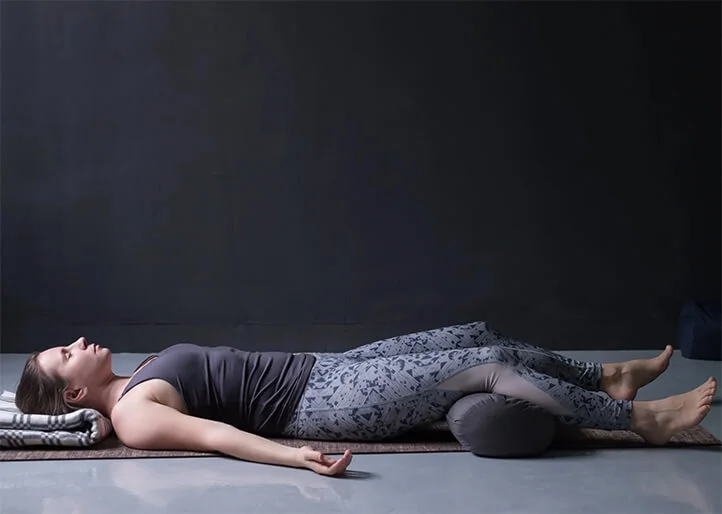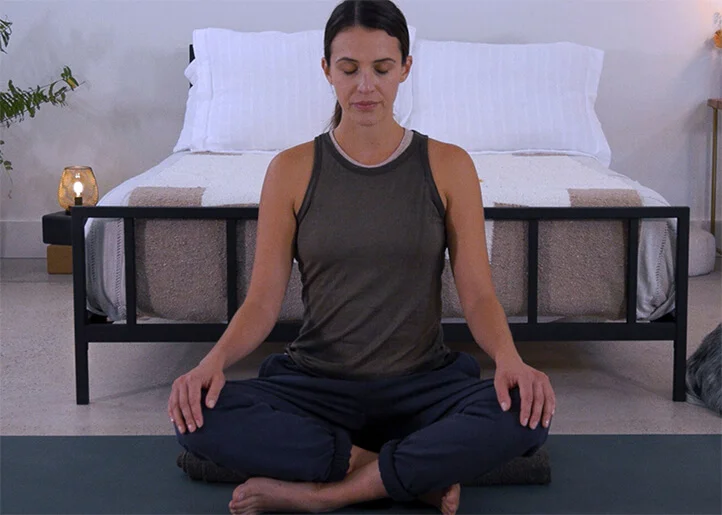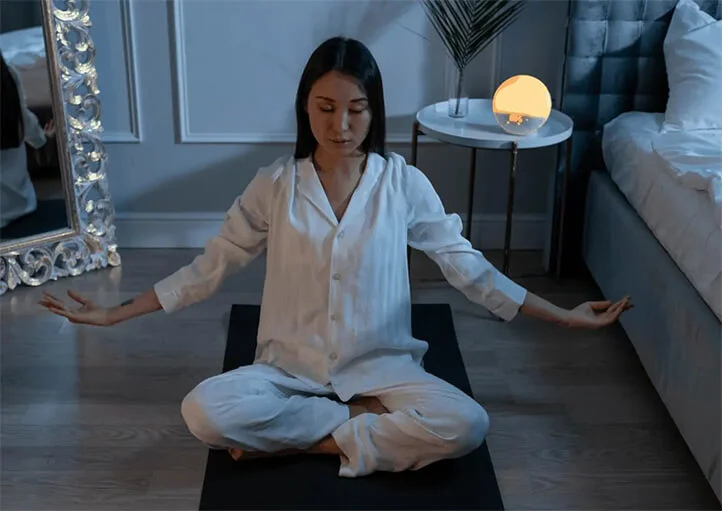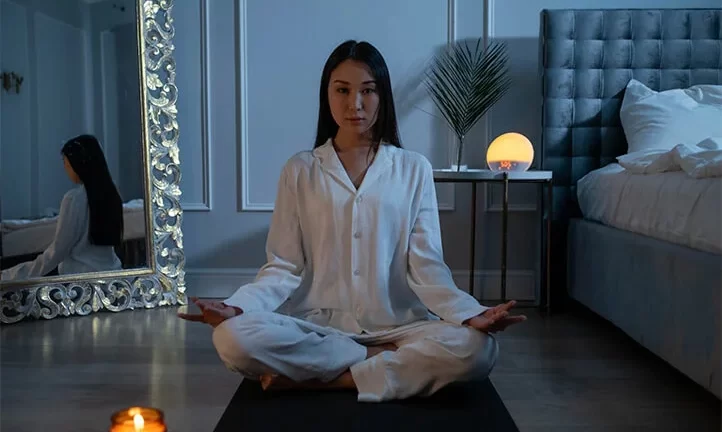Meditation before sleep is a special meditative practice conducted right before a person goes to bed, aiming to prepare the mind and body for quality and restorative rest. It includes various relaxation techniques, attention focusing, and mindfulness practices that help relieve stress, reduce anxiety, and achieve a state of calm conducive to deep and restful sleep.
Meditation before sleep has numerous positive effects on a person’s physical and mental health. Here are the main benefits:
- Promotes relaxation. After a long day filled with stress and tension, meditation helps relax the mind and body, creating favorable conditions for nighttime rest.
- Improves sleep quality. Regular meditation practice helps improve sleep quality, making it deeper and more restful.
- Reduces stress and anxiety levels. Meditation before sleep helps reduce stress and anxiety levels, which in turn facilitates falling asleep faster.
- Increases mindfulness. Meditation helps become more aware of one’s thoughts and feelings, allowing for better management of insomnia or other sleep-related issues.
- Forms healthy habits. Incorporating meditation into the evening routine helps form healthy habits that positively affect sleep quality and overall well-being.
- Promotes deep relaxation. Meditation before sleep helps achieve maximum relaxation, which is a prerequisite for quality and restorative sleep.
- Improves emotional state. Meditation provides an opportunity to improve emotional well-being, reducing the likelihood of nighttime awakenings due to anxious thoughts or worries.
- Enhances self-control. Meditation allows for better control over the mind, helping to get rid of obsessive thoughts or worries that hinder sleep.
- Supports physical health. By reducing stress and improving the quality of nighttime rest, meditation before sleep can also positively affect long-term physical health.
Considering all these benefits, meditation before sleep can become an important part of the evening routine for those looking to improve their sleep and overall well-being.

Benefits of Meditation Before Sleep
In the dynamic world of today, where stress and daily concerns often leave little room for rest, the practice of meditation before sleep can become a kind of salvation. It is a time to pause, slow down, and truly enjoy a moment of peace before drifting off to sleep. Specialized meditation techniques not only improve sleep quality but also help form a harmonious inner space, promoting overall well-being and health.
Evening time is often associated with rest and relaxation, and in this context, meditation before sleep can become a valuable tool for achieving the much-desired tranquility. Freeing the mind from numerous thoughts and concerns paves the way for deep and restorative sleep, establishing healthier habits and deepening self-awareness.
Meditation before sleep is not just a way to end the day on a positive note. It is a great opportunity to rethink your evening ritual, turning it into a source of peace and harmony. Such a practice is a powerful ally in combating insomnia and anxiety, ensuring a calm and restful sleep, which in turn positively affects overall physical and mental health.
Transforming the evening routine with meditation can be the key to a new level of well-being. From carefully selecting relaxation techniques to creating a peaceful atmosphere, this practice promises not only improved sleep quality but also the ability to greet each new day with a smile and enthusiasm, laying the foundation for a happier and healthier life.
Improving Sleep Quality
Improving sleep quality is often a priority for many people striving for a healthy lifestyle. In this context, meditation before sleep can become an indispensable helper. Let’s explore this in more detail.
- Firstly, meditation before sleep helps strengthen the mind-body connection, allowing an individual to better recognize their physiological needs, which in turn leads to more restful sleep. Meditation helps relax muscles and relieve physical tension, which is often the cause of insomnia or shallow sleep.
- Secondly, the practice of meditation before sleep reduces stress and anxiety levels—two factors that often hinder falling asleep. Through deep breathing and mindfulness processes, one learns to let go of the day’s concerns, easing the transition into sleep and ensuring a healthier and more efficient restoration of energy throughout the night.
- Additionally, regular meditation before sleep helps develop healthier sleep habits, creating a favorable atmosphere for rest and relaxation. This includes meditation techniques aimed at improving the circadian rhythm, such as focusing on breathing or meditative listening to calming music.
Reducing Stress and Anxiety Levels
In modern society, stress and anxiety are often daily companions for many people, and their impact on sleep quality cannot be underestimated. Meditation before sleep, in this context, is a powerful tool for reducing stress and anxiety levels, thereby creating a conducive environment for nighttime rest.
The practice of meditation before sleep promotes deep mental relaxation, allowing the release of anxious thoughts and stress reactions that arise during the day. Mindful focus on breathing and bodily sensations creates a space of silence and calm where anxious thoughts can be gently released.
In addition, meditation before sleep fosters the development of a more positive and compassionate attitude toward oneself. This is particularly beneficial for those experiencing heightened anxiety, as meditation teaches individuals to approach their anxious thoughts with greater understanding and tolerance, thereby reducing their negative impact on sleep.
Moreover, regular meditation practice can lead to a long-term reduction in stress levels, as it helps develop the ability to stay in the present moment, avoiding unnecessary fixation on stressful situations or potential future problems.
Enhancing Overall Well-being
Enhancing overall well-being is one of the key aspects of regular meditation before sleep. In this regard, this practice can serve as a powerful tool for strengthening an individual’s physical, emotional, and mental health.
Physical well-being can be improved through relaxation and the reduction of muscle tension, which often accumulates throughout the day. Meditation before sleep allows the body to relax, not only ensuring a good night’s sleep but also facilitating physical recovery after a hard day’s work.
On an emotional level, meditation helps alleviate depression and anxiety, creating space for more positive and balanced emotional states. The process of awareness and acceptance of one’s feelings can lead to tranquility and harmony.
From a mental perspective, meditation before sleep enhances the quality of mental activity, strengthening cognitive functions and contributing to better focus. This is especially important for those whose activities require increased productivity and creative thinking.
Overall, meditation before sleep can become a valuable addition to routine evening rituals, promoting enhanced overall well-being and happiness.
Improving Physical Health
In our pursuit of a healthy lifestyle, quality rest plays an important role, which can be significantly improved with proper meditation practice.
- Firstly, meditation in the evening promotes deeper and more restorative sleep, positively affecting health. Good sleep is the foundation for body recovery, allowing us to start a new day with a good energy boost and renewed physical resources.
- Secondly, regular meditation practice helps reduce chronic stress and tension, which are often the cause of various physical ailments. Meditation helps lower cortisol levels—the stress hormone—thus enhancing the immune system and increasing overall body performance.
- A third aspect is meditation’s ability to relieve pain and discomfort in the body. Through mindfulness practice, we learn to better perceive and regulate our physical sensations, which helps reduce pain symptoms and improve overall health.
- Furthermore, meditation before sleep normalizes cardiovascular system function. The calming effect of meditation on heart rate and blood pressure makes it an effective tool for maintaining heart and vascular health.

Different Ways of Meditating Before Sleep
Mindfulness, progressive relaxation, breathing exercises—the variety of meditation methods before sleep is vast and diverse. Each of these techniques aims to help clear your mind from the day’s hustle and bustle, find inner peace, and prepare for a restful night. Regardless of your experience with meditation, among the suggested methods, you will surely find one that suits your individual needs and preferences.
Mindfulness meditation allows you to immerse yourself in the present moment by focusing on your breathing and physical sensations. This practice helps reduce stress and anxiety, opening the door to calmness and harmony before sleep. On the other hand, guided meditation led by an online instructor takes you through a slow-paced narration or visualization, gradually leading you into a world of relaxation and tranquility.
There are other methods as well, such as progressive relaxation, which teaches you to sequentially relax different muscle groups in your body, promoting physical relaxation and preparation for sleep. Breathing meditation, in turn, focuses on deep, conscious breathing, creating ideal conditions for quality sleep.
Progressive Muscle Relaxation
Progressive muscle relaxation, also known as progressive muscle relaxation, is a method developed to combat stress through systematic tension and subsequent relaxation of different muscle groups in the body. This technique helps understand the difference between feelings of tension and relaxation in the muscles, contributing to deep physical relaxation and tranquility.
This method involves engaging and sequentially working with different parts of the body. First, you focus on a specific muscle group, tensing them for a few seconds, then consciously relaxing them, paying attention to the change in sensations. This process is repeated for various muscle groups throughout the body.
Progressive relaxation is especially useful before sleep, as it helps calm down after the day’s experiences, release accumulated stress and tension, and prepare the body for quality rest.
Mindful Breathing
Mindful breathing is a practice in which a person fully engages in the breathing process, focusing on each inhale and exhale. This technique, often used in meditation and yoga, helps to calm down, reduce stress, and enhance the perception of the present moment.
With regular practice of mindful breathing, you will learn to notice how thoughts and feelings are connected to your breathing. This can become a way to establish a deep connection with yourself, helping relieve tension and prepare for sleep.
Focusing on breathing before sleep not only promotes relaxation but also improves the quality of nighttime rest, ensuring quick sleep onset and easing the transition into a deep sleep phase. Mindful breathing can serve as a bridge connecting wakefulness with the world of sleep, where the body and mind recover and prepare for a new day.
Visualization
Visualization is a technique that uses imagination to create calming and positive visual images. In the context of meditation before sleep, it can become a powerful tool for achieving a deep state of relaxation and preparing for falling asleep.
The practice of visualization before sleep often includes imagining peaceful and pleasant images, places, or situations that can help relieve anxiety and stress associated with everyday life. It could be an imaginary place where you feel completely relaxed and safe or a scene that evokes feelings of joy and satisfaction.
By applying visualization in evening meditation, you create a psychological space that fosters tranquility, easing the transition from active wakefulness to peaceful sleep.
Sound Meditation
Sound meditation is a technique where sounds or music are used as a means to facilitate the transition into a meditative trance or deep relaxation. It can be an especially useful tool in preparing for sleep, creating an atmosphere of calm and peace.
During sleep meditation, sound accompaniment is used to suppress internal mental noise and anxiety, which often prevents us from relaxing and falling asleep. These can be sounds of nature, meditative music, bell ringing, or even recordings of deep, rhythmic breathing.
Meditative sounds help establish an inner rhythm that supports the relaxation process and eases the descent into sleep, as well as redirecting attention to harmonious vibrations and soothing melodies.
This type of meditation is an effective tool for achieving a deep level of relaxation, creating optimal conditions for quality and restorative sleep.

Preparation for Meditation
Preparation for meditation is an important stage that precedes the practice itself. This is a time to step away from the daily hustle and prepare yourself to immerse in a world of inner harmony and tranquility.
Meditative practice begins long before taking a comfortable pose or focusing on breathing. Preparation for meditation is the first step on the path to self-awareness, where every element, from your inner state to the surrounding environment, plays a role in creating a favorable space for evening relaxation.
Already during the preparation for meditation, it is advisable to try to slow down your internal rhythm, distract from daily concerns, and tune into waves of calmness and harmony. This is a time to create an atmosphere of deep personal introspection and relaxation, contributing to recovery and deepening self-awareness.
Each step towards meditative practice is an important link in the chain of personal growth and self-development. Starting from the preparation stage, you lay the foundation for the transformative experience that awaits you in the process of meditation before sleep.
Creating a Favorable Environment
Creating a favorable environment is a central aspect of successful meditative practice. A refreshing atmosphere conducive to relaxation acts as a catalyst for deep and restorative sleep. From soft music to a comfortable place for meditation, every element matters in creating an optimal setting for self-communion.
For each person, a “favorable environment” may look different. It could be a quiet room with soft lighting, aromatic candles, or even a pleasant corner in nature. The main thing is to create a space that promotes relaxation and calmness, where one can disconnect from the outside world and fully focus on oneself.
The importance of creating a favorable environment cannot be underestimated. It not only serves as a background for your practice but also actively participates in shaping the meditation experience. A well-prepared space can enhance your meditative efforts, making it easier to achieve a state of relaxation and inner harmony.
Choosing a Comfortable Pose
Choosing a comfortable pose for meditation before sleep is key to a successful practice, helping you to more easily immerse yourself in a state of relaxation and tranquility. In a comfortable pose, you can truly release physical tension and focus on internal sensations.
Being in a pose that suits you best allows you to more easily detach from the outside world and create a harmonious interaction between body and mind, facilitating the transition into a state of meditative calm.
It is important to remember that “comfort” is an individual concept. For some, this might be the classic lotus pose, while for others, it could be a semi-reclined position with pillows for support. The main thing is to find a pose in which you can spend some time without pain or discomfort, fully concentrating on the meditation process.
Also, remember that the choice of pose depends on the specific meditation practice. Experiment with different poses to find the one that will perfectly complement your meditation before sleep, providing favorable conditions for achieving a state of deep relaxation.
Setting the Right Mood
Setting the right mood can be achieved in various ways, depending on your individual preferences. This could include listening to calming music, aromatherapy, or reading motivational quotes before starting meditation. The key here is to create a space that fosters inner peace and harmony, allowing you to easily immerse yourself in a meditative state.
It’s also important to note that the “right” mood is one that meets your individual needs and preferences at the moment. Remember that meditation before sleep is a practice that should adapt to you, not the other way around.

Meditation Before Sleep: A Step-by-Step Guide
Meditation before sleep is a delicate process aimed at uniting the mind and body into a harmonious whole, providing peace and tranquility in preparation for a restful night. This practice involves going through a series of steps, each of which plays a crucial role in preparing you for a good night’s sleep.
When learning the practice of meditation, it is essential to follow a methodical approach, paying attention to each step. This helps to make the process cohesive and holistic, ensuring a smooth transition from the active, wakeful state of the day to a calm and restful night’s sleep.
Step 1: Focus on Your Breathing
We begin with the most natural and, at the same time, vital process—breathing. This fundamental aspect of meditation serves as an excellent tool for strengthening the connection between the mind and body. By focusing on each inhale and exhale, we create space for mental calm, clearing the mind of the daily life’s hustle and bustle.
Feel how, with each inhale, your body fills with energy, and with each exhale, tension and stress leave. This step not only promotes inner calm but also serves as a foundation for further meditation practice before sleep.
Step 2: Apply Relaxation Techniques
The next step is to introduce relaxation techniques that will help you immerse yourself in a state of peace and rest. These techniques can range from simple muscle relaxation exercises to mindfulness techniques aimed at reducing anxiety. At this stage, you can experiment with different techniques, such as progressive relaxation, visualization, or even using sounds to create a soothing atmosphere.
The goal is to create conditions in which you can forget all your daily problems and focus on the present moment, preparing for sleep with a positive and peaceful mindset.
Step 3: Visualize Positive Images or Scenes
The next step in your bedtime meditation practice should be the visualization of positive images or scenes. This step allows you to use the power of imagination as a tool to create inner calm.
Try to imagine vivid pictures or scenes that evoke a sense of serenity, joy, and harmony in you. This could be a beautiful natural landscape, a warm sunset by the sea, or even moments of a joyful meeting with loved ones.
Through visualization, a psychological space is created that promotes enhanced relaxation and preparation for deep and quality sleep.
Step 4: Conclude the Meditation
As you approach the end of your bedtime meditation, pay attention to concluding the process. This final step is the moment to reinforce all the positive feelings and impressions you’ve accumulated during your meditation session.
Now that your mind is calm and your body feels deeply relaxed, you can thank yourself for taking care of your well-being. This is also a great opportunity to set a positive intention for the upcoming sleep, creating a foundation for a more restful and restorative rest.
Allow yourself to fall asleep with a sense of peace, harmony, and gratitude, knowing that you have taken an important step toward improving your sleep quality and overall well-being.

Tips and Recommendations
Everyone strives for well-being and harmony, especially when the hustle and bustle of the day gives way to nighttime calm. Meditation before sleep opens the door to a world of deeper and better-quality rest, providing a chance to reflect on the day and seamlessly enter the new one. This practice can become a valuable tool for maintaining emotional and mental health and improving sleep quality.
Creating a conducive atmosphere for meditation, choosing suitable techniques and methods adapted to each person’s individual needs, is key to a successful practice. Preparing for meditation, choosing the format, and integrating this practice into an evening ritual can become the key to deep and restorative sleep.
Of course, there can be certain challenges along the way. However, by acknowledging and overcoming them, you will discover new horizons of comfort and harmony before sleep. A proper approach to meditation can turn part of your evening time into a phase of relaxation and self-discovery.
How Often Should You Meditate?
The frequency of meditation before sleep depends on individual preferences and needs. For some, meditating a few times a week is enough to notice positive changes, while others may need to meditate every evening and make it part of their evening ritual.
It is important to remember that the quality of practice often outweighs its quantity. The goal is to create a habit that promotes deep relaxation and prepares you for sleep, rather than becoming a source of additional stress or pressure. Start with short sessions, gradually increasing the duration as it becomes more comfortable and natural for you.
Experts often recommend daily meditation practice to fully experience its beneficial effects and enrich your experience. However, the main thing is to find joy and satisfaction in the process rather than striving for specific results. By listening to your body and mind, you will surely find the rhythm that suits you best.
Tips for Beginners
Here are some tips to help make the first steps into bedtime meditation more comfortable and productive:
- Start with short sessions. Initially, devote only 5-10 minutes to meditation. Over time, as you become more experienced, you can increase the length of your sessions.
- Create a conducive environment. Prepare a quiet and calm place where you will not be disturbed. You can use candles or an aroma lamp to create a cozy atmosphere.
- Find a comfortable position. Find a comfortable pose. It could be a sitting position with a straight back or a lying position on your back with relaxed arms and legs.
- Focus on your breathing. One of the simplest ways to start meditation is to focus on your breathing. Just observe your breath without trying to control it.
- Be patient with yourself. If you find it difficult to concentrate or have unpleasant thoughts, just acknowledge it and gently bring your attention back to the meditation object.
- Practice regularly. Try to meditate regularly, even if it’s just a few minutes a day. Consistency will help establish the habit and deepen the practice.
- Use guides and apps. To begin with, you can use meditation guides or apps that offer various techniques and help you immerse yourself in the process.
- Make bedtime meditation a ritual. Try to meditate at the same time every day, creating an evening ritual that signals your body that it’s time to rest.
- Record your experience. After meditation, jot down your experience in a journal. This will help track progress and notice what works best for you.
- Be patient. Meditation is a process, and results may not appear immediately. Be patient and continue to practice without expecting immediate effects.




